SARIO
Sario is one of the old ones who still remember the “deep” language, as they call it. He helps Pastor Rice transcribe rituals in Kalahan while I enter and edit the info on the computer. Sario’s father and grandfather were mabaki – ritual leaders. He is widely known and respected, the kind of man who travels alone to the far places and who the children whisper about when he passes slowly through town. Like many of the Kalahan men, he carries the ak-bote, a goat-hide backpack bound to his back with rattan straps. Somehow his forehead wrinkles formed a permanent fold that makes him look constantly surprised; the fold raises his eyebrows up above glasses that obscure his squinty eyes. He sometimes lets two patches of his mustache on either side of his lips grow out into a straggly gray strands. I think they look like the tail feathers of some tropical bird.
When I gather my courage to try out my Kalahan with him, I sense amusement in his eyes. He doesn’t take me seriously. I love this about him because this is a town that turns all of its attention to the amputi (white). But Sario is at the most slightly amused by me, and brushes off my comments with a grunt.
I recently discovered that Sario is a poet. He wrote many of the Kalahan hymns for their own hymnal. Also, I saw some of his poetic verse, called ba-liw in Kalahan, in some old files that Pastor gave me to transcribe into the computer. The ba-liw are beautiful verses composed creatively (not memorized – made up on the spot). Elders mostly chant ba-liw as forms of advice to a couple during their wedding, but the chants can be used at other celebrations or in debates as well.
Here is an example of a ba-liw recorded in 1970 in English. Though translating it from Kalahan loses the rhyme and syllable pattern, I think the beauty of the words is retained.
“Chant of the Gambler’s Wife”
I – To her Child
Pull the scarecrow strings
To scatter the rice birds
Perhaps they will leave some
White rice
Because that will be my lunch
They say my companion is there
They say he is in Lonsod
And he lost his Lonsod horse
He lost his horse in gambling.
II – To her Husband
Come and return
Never mind what you lost
The hundreds that you lost
There are piglets there
There are our pigs there
Even the striped sow
Hanging their heads
Because of your debts of hundreds.
Note: The animals know that they will be sacrificed to pay the debts, but the wife forgives.
Subscribe to:
Post Comments (Atom)




No comments:
Post a Comment